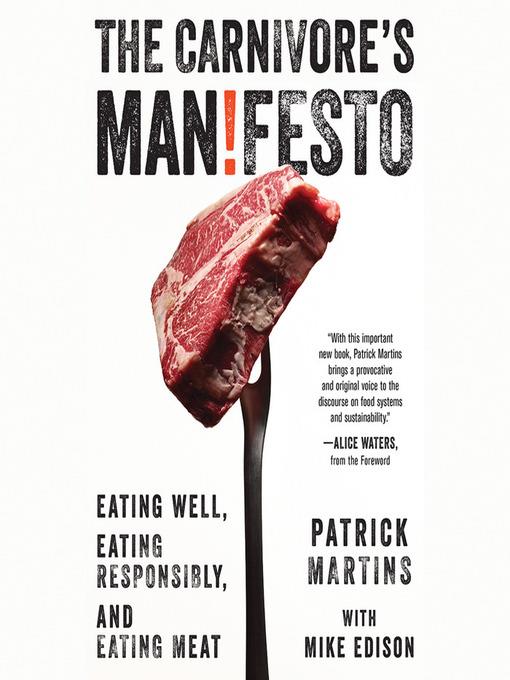
The Carnivore's Manifesto
Eating Well, Eating Responsibly, and Eating Meat
- اطلاعات
- نقد و بررسی
- دیدگاه کاربران
نقد و بررسی

May 5, 2014
Martins, founder of Slow Foods USA and Heritage Foods USA, which distributes rare-breed, humanely raised heritage meats, clearly has a financial stake in getting people to turn their backs on factory farms and fast food, but he also puts his money where his mouth is. Using 50 ultrashort chapters full of one-liners (“Slow food is people. Not the same way that Soylent Green is people”) and featuring conversational prose straight out of Martins’s radio show, the author has created a blueprint for healthy eating, sustainable farming, biodiversity, as well as for protecting culinary traditions and cultural differences. Martins is passionate, preachy, and, above all, practical—he doesn’t want you to make your own ketchup or give up pizza, just to buy the best meat and produce that is in season and to chose “quality” food over “commodity” food. While he doesn’t solve problems like how low-income families can find or afford “quality food” or how “global warming is turning agricultural havens into deserts,” he does present a commonsense approach to eating, farming, and food processing that would benefit both our taste buds and our planet. Agent: Angela Miller, the Miller Agency.

May 15, 2014
A loosely organized, lively and challenging collection of observations, ideas, philosophical meanderings and ethical concerns related to the meat we put on our plates.Along with former High Times editor Edison (Dirty! Dirty! Dirty!: Of Playboys, Pigs, and Penthouse Paupers-An American Tale of Sex and Wonder, 2011, etc.), Martins takes a scattershot approach to the discussion, dividing the book into 50 short chapters that cut a wide swath, covering everything from slow food principles to the inhumane treatment of animals on factory farms to how to build a slaughterhouse and the importance of biodiversity and rare heritage breeds. Martins uses the word tetoir for cultures and communities that hand down food traditions, creating distinctive flavors much in the way terroir gives wine its distinct characteristics. Martins, who founded Slow Food USA, now runs Heritage Foods USA, a purveyor of meats from farmers who humanely raise rare or heritage breeds without antibiotics or hormones. His free-ranging thought process, at times distracting, always comes back to slow food basics: ."..sourcing responsibly, recognizing the farmer's work and understanding exactly what we are eating and where it comes from." For example, a dirt-scratching Narragansett turkey that freely roamed the barnyard will have a different taste than one raised in a windowless barn under bright lights, its beak and toenails removed, unable to stand due to its inordinately large breasts. Consumers may abhor such treatment, but are they ready to pay $140 for "a robust, healthy animal that lived a great life?" Martins recognizes that the economic realities of big agriculture vs. independent farmers, distributors and purveyors are the biggest obstacles to his manifesto, but he remains optimistic that consumer demand may eventually bring changes to the supply chain. It begins with getting to know the farmers, butchers and green grocers who bring food to our tables; it's about "provenance."A passionate call for "responsible meat-eating" and what that means, as well as an explanation of the small steps required for accomplishing it.
COPYRIGHT(2014) Kirkus Reviews, ALL RIGHTS RESERVED.

August 1, 2014
In this "manifesto," the authors cover a range of subjects relating to "eating the best and preserving the unique." The 50 chapters, which have catchy titles and are fewer than five pages in length each address, for example, "Not So Candid Camera" (which discusses how the meat industry is not transparent); "Take Back Lunch" (pack your lunch or eat at local restaurants, say the authors); and "Let It Rot" (addressing the obsession with sell-by-date). Other topics include raising heritage breeds, sustainable farming, and even the steps for building a slaughterhouse. After working with Carlo Petrini, the originator of the Slow Food Movement, Martins began his quest of buying and eating locally. He then formed Slow Food USA and followed with its marketing arm, Heritage Foods USA. The author's conversational style may bother serious readers and those who are not used to nonfiction that includes cursing. However, there's no question that Martins is sincere in his quest to preserve breeds of animals and to encourage anyone who will listen that it is vital to care, cultivate, and connect. VERDICT Libraries with patrons who are interested in the topic may consider this title.--Christine E. Bulson, emeritus, Milne Lib., SUNY Oneonta
Copyright 2014 Library Journal, LLC Used with permission.




دیدگاه کاربران